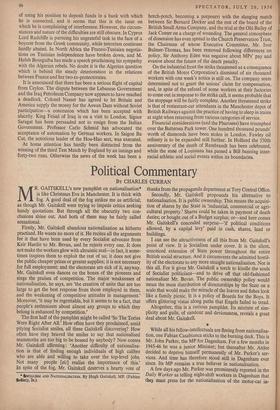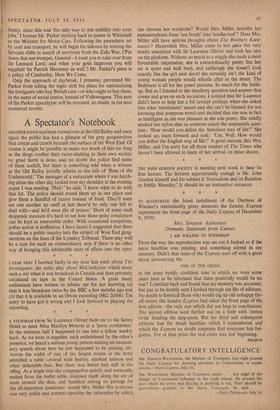Political Commentary
BY CHARLES CURRAN MR. GAITSKELL's new pamphlet on nationalisation* is like Christmas Eve in Manchester. It is thick with fog. A good deal of the fog strikes me as artificial; as though Mr. Gaitskell were trying to impede critics seeking handy quotations. But through all the obscurity two con- clusions shine out. And both of them may be fairly called sensational.
Firstly, Mr. Gaitskell abandons nationalisation as hitherto practised. He wants no more of it. He recites all the arguments for it that have been used by every Socialist advocate from Keir Hardie to Mr. Bevan, and he rejects every one. It does not make the workers glow with altruistic zeal—in fact, it some- times inspires them to exploit the rest of us; it does not give the public cheaper prices or greater supplies; it is not necessary for full employment; and the electorate are sick of it, anyway. Mr. Gaitskell even dances on the bones of the pioneers and sings the praises of competition. The major weaknesses of nationalisation, he says, are 'the creation of units that are too large to get the best response from those employed in them, and the weakening of competitive attitudes in management.' Moreover, 'it may be regrettable, but it seems to be a fact, that people's enthusiasm about almost any groups to which they belong is enhanced by competition.'
The first half of the pamphlet might be called `So The Tories Were Right After All.' How often have they proclaimed, amid pitying Socialist smiles, all these Gaitskell discoveries.? How often have they braved the smiles to say that nationalised mammoths are too big to be bossed by anybody? Now comes Mr. Gaitskell affirming: 'Another difficulty of nationalisa- tion is that of finding enough individuals of high calibre who are able and willing to take over the top-level jobs. Not many people [sic] realise the importance of this.' In spite of the fog, Mr. Gaitskell deserves a hearty vote of • SOCIALISM AND NATIONALISATION. By Hugh Gaitskell, MP. (Fabian gaiety, 2s.). thanks from the propaganda department at Tory Central Office.
Secondly, Mr. Gaitskell propounds his alternative to nationalisation. It is public ownership. This means the acquisi- tion of shares by the State in 'industrial, commercial or agri- cultural property.' Shares could be taken in payment of death duties; or bought out of a Budget surplus; or—and here comes Mr. Gaitskell's concealed surprise-1f political conditions allowed, by a capital levy' paid in cash, shares, land or buildings.
I can see the attractiveness of all this from Mr. Gaitskell's point of view. It is Socialism under cover. It is the silent, unnoticed extension of State power throughout the entire British social structure. And it circumvents the admitted hostil- ity of the electorate to any more straight nationalisation. Nor is this all. For it gives Mr. Gaitskell a torch to kindle the souls of Socialist politicians—and to drive off that old-fashioned nationaliser Mr. Bevan. The public ownership policy would mean the mass distribution of directorships by the State on a scale that would make the miracle of the loaves and fishes look like a family picnic. It is a policy of Boards for the Boys. It offers glittering vistas along paths that Engels failed to tread.
Altogether, this is a curious pamphlet. Its mixture of sim- plicity and guile, of candour and deviousness, reveals a great deal about Mr. Gaitskell.
While all his fellow-intellectuals are fleeing from nationalisa- tion, one Fabian Casabianca sticks to the burning deck. This is Mr. John Parker, the MP for Dagenham. For a few months in 1945-46 he was a junior Minister; but thereafter Mr. Attlee decided to deprive himself permanently of Mr. Parker's ser- vices. And time has therefore stood still in Dagenham ever since. Its MP remains a true believer in nationalisation.
A few days ago Mr. Parker was prominently reported in the Daily Worker as telling night-shift workers in Dagenham that they must press for the natiorialisation of the motor-car in- dustry, since this was 'the only way to put stability into your Jobs.' I foresee Mr. Parker striding back to power in Whitehall as the Minister for Motor-Cars. Following the precedents set by coal and transport, he will begin his labours by touring the Services clubs in search of survivors from the Zulu War. (Tut down that ear-trumpet. General—I want you to take over from Sir Leonard Lord; and when your gout improves you will supplant Sir Patrick Hennessy as well.') Mr. Parker's piece is a policy of Camberley, Here We Come.
Only the approach of daybreak, I presume, prevented Mr. Parker from telling the night shift his plans for nationalising the foreigners who buy British cars—or who ought to buy them, in the name of social justice, instead of Volkswagens. This part of the Parker apocalypse will be revealed, no doubt, in his next nocturnal reverie.



















































 Previous page
Previous page